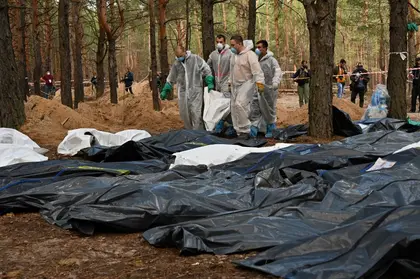As the Russian invasion of Ukraine approaches its one-year anniversary, the international community is becoming more aware of Russia’s atrocities. News from the Russian-occupied territories has spread. Russian crimes have ranged from targeting schools, hospitals, and religious institutions to residential areas, nursing homes, and cultural centers. Tens of thousands of Ukrainians have died from these unprovoked Russian attacks, and numerous cities and villages have been destroyed. United Nations experts also found that Russian soldiers have raped and tortured Ukrainian women and children.
- See the newest war in ukraine update from the Kyiv Post's news bulletins published today.
The atrocities have not stopped there. Throughout the war, hundreds of thousands of Ukrainian citizens have been forcibly deported to Russia. Once they arrive to Russia, the Russian government has forced these deported Ukrainians to assimilate into Russian society.
JOIN US ON TELEGRAM
Follow our coverage of the war on the @Kyivpost_official.
Unfortunately, these acts committed by the Russians only scratch the surface. When Ukraine launched its counteroffensive in April 2022, Ukrainian forces reclaimed territory in northern and eastern Ukraine. As they entered these cities and villages, Ukrainian forces found civilian bodies scattered throughout the streets. In Bucha, a town outside of Kyiv, hundreds of dead civilians were found in the streets. Some of them had gunshot wounds while others had their hands tied.
The Ukrainians found similar horrific scenes in Izyum, a city in Kharkiv region. When Ukrainian forces arrived, they found hundreds of bodies in a mass grave. As the Ukrainians examined the bodies, they found that several had been tortured and mutilated by Russian forces. Like the events in Bucha, the images that emerged from Izyum were met with outrage, and the international community stated this was further evidence that Russia was committing war crimes.

Latest on Russia’s Intransigence to End War Against Ukraine
While the international community has condemned Russia’s actions in the occupied territories of Ukraine, the response within the Russian Federation has been quite different. When images of the atrocities in Bucha emerged, Russian officials claimed the pictures were fake. For example, when knowledge of the mass grave in Izyum surfaced, Russian Foreign Minister Sergei Lavrov “accused Ukrainian forces of killing civilians in the eastern Donbas region.”
But these Russian statements are false. Throughout the war, numerous “high-resolution satellite images” confirmed the authenticity of the dead bodies and mass graves throughout the formerly occupied Russian territories. An independent report published by the UN also stated that the Russians have executed Ukrainian civilians in the occupied territories.
In other words, there is irrefutable evidence that the Russians are committing atrocities in Ukraine. But the Kremlin has continued to issue false statements about the war.
Russian media has also participated in this propaganda campaign. Various Russian television networks have repeated these talking points, stating that Ukrainian forces are responsible for the deaths of these civilians in northern, eastern, and southern Ukraine. Other Russian media platforms have called these situations “an elaborate hoax.” While their claims are undoubtedly false, Russian media shows no signs of altering its stance on these issues.
According to recent reports, the majority of Russian citizens rely on Russian media as their primary news source. As a result, Russian citizens have supported “Putin’s decision to use military force in Ukraine.” Russian media has also attempted to craft new strategies on how to spread these fake messages.
But outside of Russia, these efforts have been unsuccessful. While Russian propaganda has attempted to change the narrative on Russia’s involvement in Ukraine, the majority of the world has condemned Russia for its invasion. The international community’s strong stance against the Russian invasion suggests that Russia’s propaganda attempts abroad have failed.
Worldwide condemnation of the war has also expanded. Initially, politicians and other influential leaders called for an immediate Russian withdrawal from Ukraine. When this did not work, numerous countries imposed stiff sanctions on the Russian Federation. While Russia has lost hundreds of billions of dollars, the war continues. In other words, Russia’s ongoing actions in Ukraine suggest that international sanctions have not forced the Russians to change their behavior.
As a result, the international community has sought other ways to try and force Russia to stop the war. Several Western countries most recently have adopted a new strategy. Over the past few months, numerous countries called for the prosecution of Russian officials and soldiers for the atrocities committed in Ukraine. Several international leaders have submitted war crimes probes to the International Court of Justice to investigate Russia’s actions in Ukraine. To date, 34 countries from Europe, North America, and Oceania have filed claims to the International Court of Justice to investigate Russian atrocities in Ukraine. It is likely many more countries will submit additional claims as the war continues.
It will take time for the ICJ to investigate the claims submitted by these countries, but perhaps this is a new avenue where the international community can punish Russia for its actions in Ukraine. Current efforts to try and stop Russia have failed. Sanctions have not deterred the Russians from their behavior, and international resolutions at the UN have not led to alternative outcomes either. Therefore, if previous efforts have not deterred Russia from stopping its was in Ukraine, then perhaps court proceedings will. Time will tell.
Mark Temnycky is an accredited freelance journalist covering Eastern Europe and a nonresident fellow at the Atlantic Council’s Eurasia Center. He can be found on Twitter @MTemnycky
You can also highlight the text and press Ctrl + Enter










